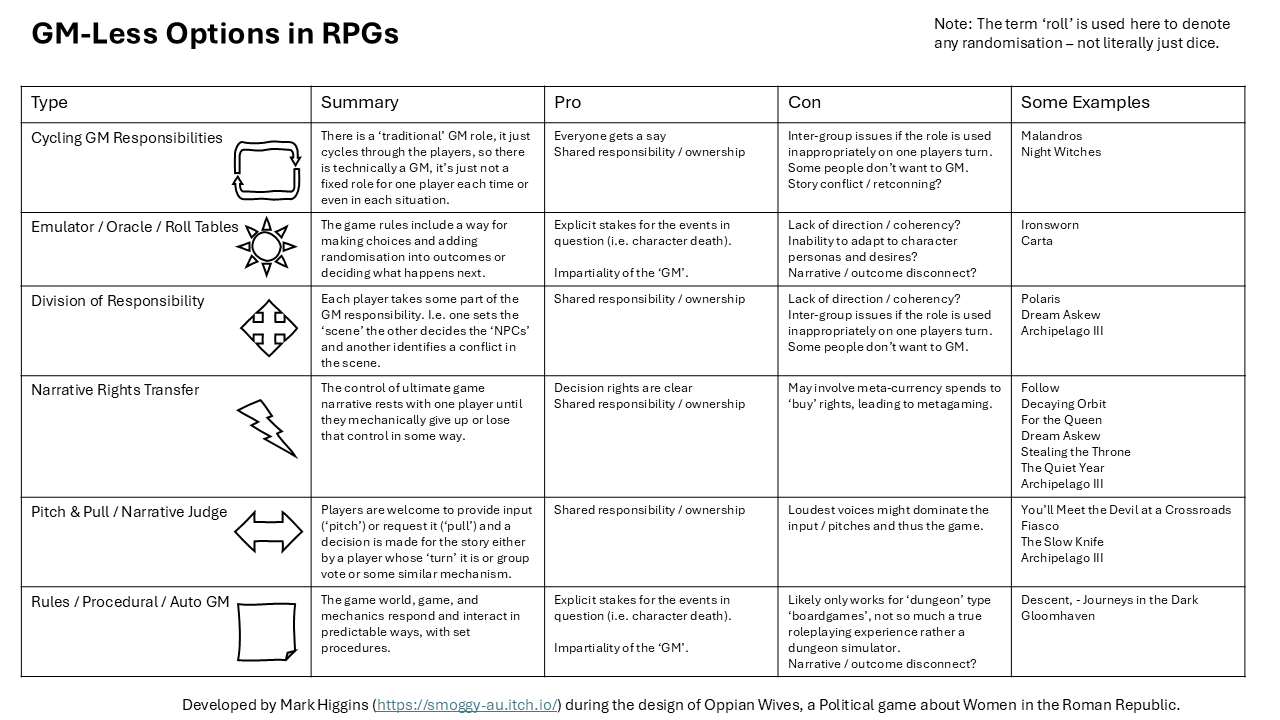GM or GM-Less?
This is one of the bigger questions that has been bugging me about Oppian Wives and its design, because somewhere deep inside of me I feel that it works as a GM-less game… but that might not be the right answer.
I’ll use this post to explore my options and maybe build myself a conceptual framework to assess with.
The Role of the GM
I first need to assess the reasons for even considering this option. Considering that I primarily play narrative and ‘new school’ RPGs which are already quite progressive compared with the role of the trad GM, I primarily think that in my games, the role of a GM contains some mix of the following elements:
- Setting management – not necessarily defining the game world and it’s narrative and history etc but managing and using it to create interesting events for the player characters.
- Event / conflict creation – again, using that setting information to create interesting situations that the player characters will engage with. Includes NPC portrayal / description.
- Pacing - moving things along – pushing for the end of scenes and creating the next things which move the action and interest forward, sometimes despite the player actions.
- Declaring Outcomes – beyond player agency and based on the player actions and whatever (if any) randomisation mechanisms, determining narratively what happens next in the world.
- Manager of ‘etiquette’ – i.e. stuff like order and turn taking, controlling the flow of narration, making voices heard, providing space for players etc.
I do not consider that the GM role includes any ‘rules control’ or anything like that, and I explicitly reject the notion that the GM has any more control over the story than the players do – as per (1) above, they MANAGE the setting and story which is generated, but they do not own it as author.
Have I missed anything here?
Reasons for GM-Less Play
I think the biggest reasons for GM-Less Play as a desired state for me include:
- The oft-cited challenges that many TTRPG gamers have with trying to find a GM and a game, including someone with the impetus and competence to do so. Reducing the friction of trying to find someone to run a game you like, or perhaps worse as a GM finding a game but no group interest is a key goal.
- The freedom which comes when there is no ‘editorial’ centre of the group, who has an arbitrary role in determining what fits in the fiction or not. The collaboration and innovation which come about when different voices are given space and freedom is impressive – these are always the stories that stick with me as a player and GM.
Mechanisms for GM-less play

Not-Final Word
To achieve a GM-less game, I’d need to have some way of addressing all of the numbered points above – which is obviously achievable since so many great games do it. I definitely think that the Drama System and the evolving adaptation I am making of it will be a good fit for GM-less play also.
I haven’t made up my mind 100% to go GM-less yet – what are your views on this?
Something to bring into playtesting I think.
Get Oppian Wives
Oppian Wives
A playtest / ashcan of the game of women in Roman politics
| Status | Prototype |
| Category | Physical game |
| Author | Smoggy AU |
| Tags | ausrpg, Tabletop role-playing game |
More posts
- Draft 0.1 is Ready for Playtest!Feb 12, 2025
- The Final (Writing) PushJan 29, 2025
- Procedural (Action) ScenesJan 13, 2025
- Oh no, I accidentally created a ‘minigame’Dec 19, 2024
- Currencies, Bennies, Points, Tokens – Rewards and the 'Core Loop'Dec 16, 2024
- The Milieu (shared imagined space)Dec 09, 2024
- Roman Mosaic BuildingDec 04, 2024
- Why Women? And Politics?Dec 02, 2024
- Social PVP Mechanics in RPGsNov 27, 2024
Leave a comment
Log in with itch.io to leave a comment.